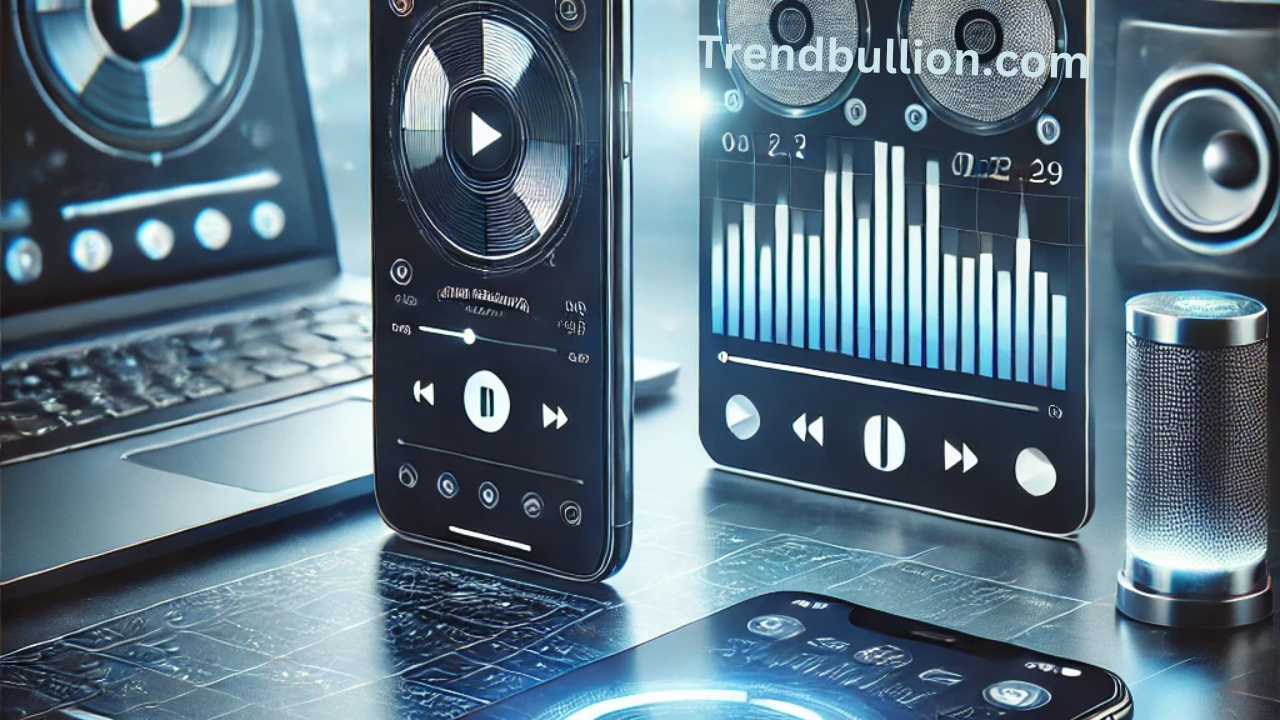Introduction
VoxPlayer Are Slow well-known music player app, particularly favoured by audiophiles for its ability to handle high-resolution audio formats like FLAC, ALAC, and DSD. Despite its advanced capabilities and appeal, many users have encountered issues where VoxPlayer appears to run slowly, affecting their overall experience. The slowness may manifest in various ways—longer load times, laggy playback, or even app crashes. If you’ve experienced these issues, you’re not alone. This comprehensive guide will explore why voxplayer are slow and provide practical, quick solutions to optimize its speed and performance. Following these tips can restore VoxPlayer’s efficiency and allow you to enjoy your favourite music without interruptions.
Clear the Cache and Temporary Files
Over time, VoxPlayer accumulates cache and temporary files to speed up its operations. While this is initially helpful, an excessive buildup of these files can slow down the app. When VoxPlayer Are Slow, clearing the cache is often the quickest solution. Doing this removes unnecessary data that may be clogging the app’s performance.
Solution:
Navigate to your device’s settings, locate the VoxPlayer app, and find the option to clear its cache. Alternatively, within VoxPlayer’s settings (if available), you can find an option to clear cache or temporary files. Performing this action periodically can keep the app running smoothly and prevent it from becoming sluggish over time.
Update to the VoxPlayer Are Slow
One reason VoxPlayer Are Slow could be because of an outdated software version. Developers consistently release updates to fix bugs, enhance performance, and introduce new features. Failing to update VoxPlayer can lead to compatibility issues, slower load times, and other performance-related problems.
Solution:
Always keep your VoxPlayer app updated to the latest version available. Visit the App Store or Google Play Store regularly and check for updates. Additionally, ensure your device’s operating system is up to date. Sometimes, compatibility between the app and the OS plays a crucial role in performance. Keeping both the app and your device’s OS current reduces the chances of slowdowns and enhances overall efficiency.
Free Up System Resources
If your device runs too many apps simultaneously, it can limit the resources available to VoxPlayer, causing it to run slowly. This is especially true if you have resource-intensive apps like games or streaming services open in the background. When VoxPlayer Are Slow, freeing up system resources is essential.
Solution:
Close any unnecessary apps running in the background. You can do this by accessing your device’s app switcher and swiping away any apps that are not in use. Restart your device periodically to clear temporary files and refresh system resources. VoxPlayer can utilize more memory and processing power by minimizing the number of active processes, significantly boosting its speed.
Optimize Your Music Library
Another factor contributing to the issue of VoxPlayer needing to be faster is the size and complexity of your music library. If you have an extensive collection of songs, especially in high-resolution formats, VoxPlayer may take longer to load and process the files. The app’s performance can degrade when handling thousands of tracks or large files like FLAC and ALAC, resulting in slow response times and laggy playback.
Solution:
Organize your music library by creating smaller playlists or folders. This helps in faster file retrieval and reduces the load on VoxPlayer. Also, consider moving some files to cloud storage services or an external device to minimize the burden on your local storage. By optimizing your library, you can help VoxPlayer process files more efficiently, leading to faster load times and smoother playback.
Adjust Audio Quality Settings
VoxPlayer’s ability to handle high-quality audio is one of its standout features. However, enabling the highest quality settings can slow down the app, especially if your device needs to be optimized for processing such resource-heavy files. When VoxPlayer Are Slow, adjusting the audio quality settings can be an effective way to enhance performance.
Solution:
Access VoxPlayer’s settings and choose a lower bitrate or switch to a more standard audio format like MP3 when high-resolution files are unnecessary. You may also turn off any additional sound enhancement features running in the background, as these can strain your device’s processor. By choosing more efficient settings, you can reduce the load on your device and speed up VoxPlayer’s performance.
Ensure a Stable Network Connection for Cloud Playback
If you stream music from cloud services like Dropbox, Google Drive, or iCloud, network issues could cause VoxPlayer Are Slow down. An unstable internet connection can result in buffering, slow loading times, or even app crashes, especially when streaming high-quality audio files.
Solution:
For the best performance, connect to a solid and stable Wi-Fi network. If you’re using mobile data, ensure that you have a reliable connection with adequate speed for streaming. Consider downloading your music files for offline playback to avoid network-related slowdowns. This ensures that the performance of VoxPlayer is not dependent on your internet connection, providing a more consistent experience.
Manage Device Storage
Low storage space on your device can significantly impact the performance of apps, including VoxPlayer. When your device’s storage is almost complete, it struggles to allocate the necessary resources for app processes, resulting in slower operation and degraded performance. If VoxPlayer Are Slow, checking your storage capacity should be one of the first steps.
Solution:
Delete unused apps, files, or media to free up storage space. You can also transfer some of your music files to external storage or cloud services to reduce the load on your device. By maintaining sufficient free space, you ensure that VoxPlayer can operate efficiently without delays caused by storage limitations.
Disable Visual Enhancements
VoxPlayer often includes visual elements like album art, equalizer animations, or other visualizations that enhance the user experience. However, these visuals can be resource-heavy, slowing the app’s performance. When VoxPlayer Are Slow, disabling visual enhancements can help improve speed.
Solution:
Go into VoxPlayer’s settings and delete unnecessary visual features or animations. Turning off these options frees processing power for more critical tasks, like audio playback. This adjustment can make a noticeable difference, particularly on older or less powerful devices.
Reinstall VoxPlayer
Sometimes, the slowness might be due to a corrupted installation or app files. If you’ve tried other solutions and still find that VoxPlayer Are Slow, reinstalling the app may be the most effective fix. This approach can resolve issues caused by bugs, corrupted files, or improper installations.
Solution:
Uninstall VoxPlayer from your device and reinstall it from the App Store or Google Play Store. This ensures you have the latest version and that any corrupted files are replaced with fresh ones. After reinstalling, carefully restore your settings and library to avoid any performance issues.
Upgrade Your Device if Needed
If you’ve implemented all the above solutions and still notice that VoxPlayer are slow, your device’s hardware may be the limiting factor. Older devices with limited RAM and processing power may need help to keep up with VoxPlayer’s demands, especially when playing high-resolution files.
Solution:
Consider upgrading to a newer device that can handle the requirements of VoxPlayer. Look for a device with a fast processor and sufficient RAM to ensure smooth playback and multitasking. If upgrading isn’t an option, adjusting settings to lower resource usage (like reducing audio quality) can still help improve performance.
FAQs
- Why is my VoxPlayer running slow despite having sufficient device resources?
- Despite adequate resources, issues such as outdated software versions, corrupted app files, or large music libraries can cause slowness. Keeping the app updated and optimizing your library can help.
- How can I speed up VoxPlayer without reducing audio quality?
- Clearing the cache, closing background apps, and ensuring a stable network connection for streaming can help improve speed without compromising audio quality.
- Does clearing the cache in VoxPlayer make a difference in performance?
- Clearing the cache removes temporary files that may clog the app’s performance, leading to a faster and more efficient experience.
- Is a slow network connection affecting my VoxPlayer’s performance?
- If you’re streaming music from cloud services, an unstable network connection can cause buffering and slowdowns. A stable Wi-Fi connection or downloading files for offline playback can resolve this.
- Will upgrading my device fix VoxPlayer’s slowness issues?
- If your device lacks the hardware capacity to support VoxPlayer’s demands, upgrading to a newer model with better specifications can significantly improve performance.
Conclusion
VoxPlayer is a powerful tool for music lovers, but its advanced features can sometimes lead to performance issues. If you’re experiencing slowness, understanding the root causes—an outdait’sapp version, insufficient resources, or an extensive music library—can help you take the appropriate steps to optimize its performance. These quick solutions can enhance VoxPlayer Are Slow and allow you to enjoy a seamless music experience.
You May Also Read: https://trendbullion.com/1-618-753-8446/




